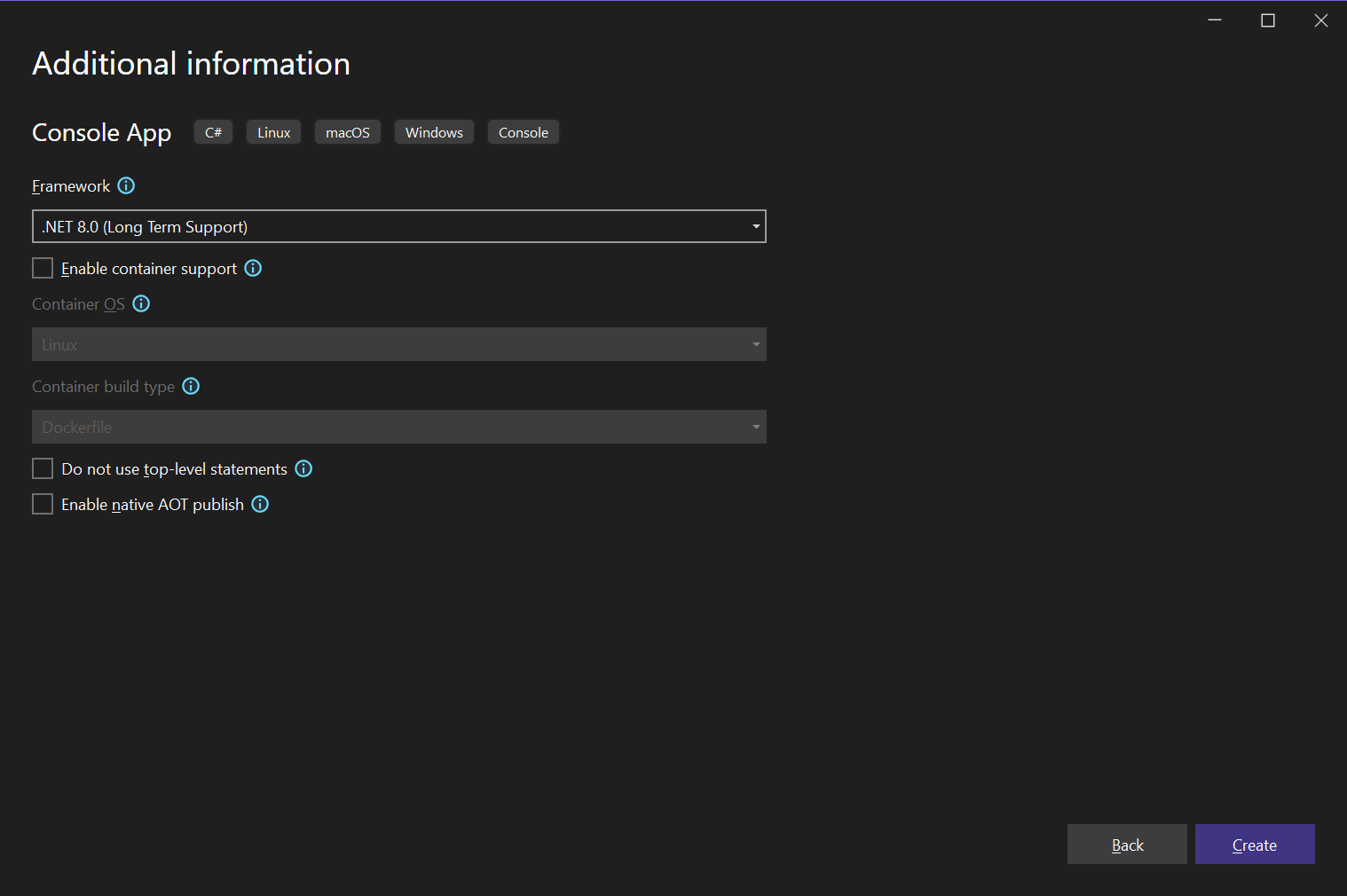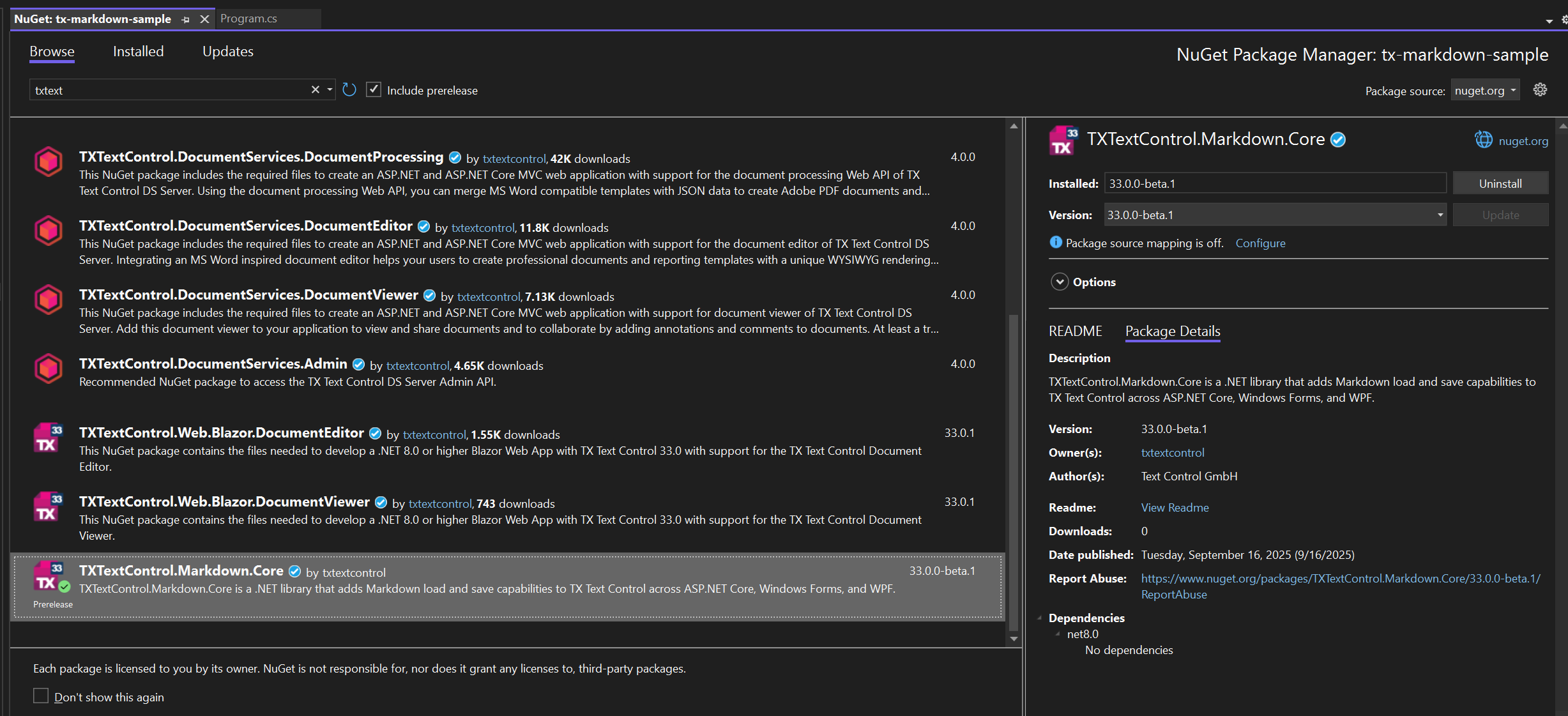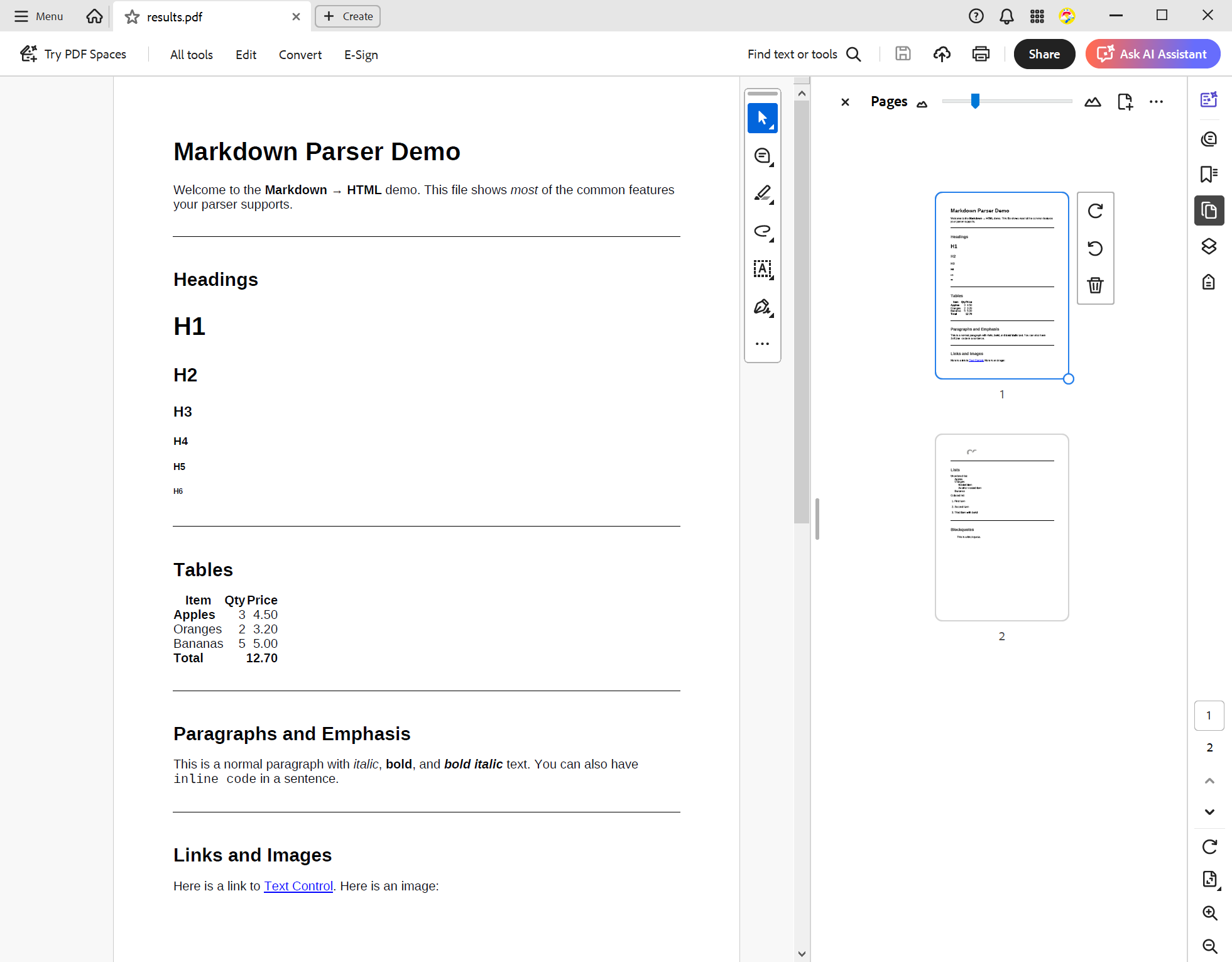Introducing TXTextControl.Markdown.Core: Import and Export Markdown in TX Text Control
We are happy to announce the release of TXTextControl.Markdown.Core, a powerful new component that enables seamless import and export of Markdown files in TX Text Control. This addition enhances the versatility of TX Text Control, allowing developers to easily work with Markdown content in their applications.

Today, TX Text Control is releasing TXTextControl.Markdown.Core 33.0.0-beta.1, a .NET 8 library that introduces first-class support for Markdown, a lightweight markup format, to the TXTextControl world.
This means that with this package you can:
- Import Markdown content into a TX Text Control document (whether ServerTextControl, WinForms, or WPF).
- Export content from a TX Text Control document to Markdown. This includes text, paragraphs, styles, etc., which are converted to Markdown syntax.
- Work with documents that originate in richer formats, such as DOCX, RTF, and HTML, and convert them to Markdown via TX Text Control. This allows you to move between rich document formats and markup. However, some style mapping may be necessary if the styles in the source documents do not match the style names supported by TX Text Control.
Key Features & Details
- The package targets .NET 8.0.
- It supports basic Markdown features: headings, paragraphs, horizontal rules, blockquotes, lists, images, links, tables.
- There's a defined set of supported paragraph styles (BODY, H1-H6, BLOCKQUOTE) and inline styles (STRONG, EM, CODE, A, etc.). These get mapped to/from Markdown appropriately.
Style to Markdown Mapping
Below is a quick reference of the supported paragraph and inline style elements, their names, and their corresponding Markdown syntax:
| Style | Markdown Syntax | Example |
|---|---|---|
| BODY | Regular paragraph text | BODY |
| H1 | # Heading 1 | H1 |
| H2 | ## Heading 2 | H2 |
| H3 | ### Heading 3 | H3 |
| H4 | #### Heading 4 | H4 |
| H5 | ##### Heading 5 | H5 |
| H6 | ###### Heading 6 | H6 |
| BLOCKQUOTE | > Blockquote | BLOCKQUOTE |
| TH | | Header | in tables | TH |
| PRE | ```code block``` | PRE |
| STRONG / B | **Bold text** | BOLD TEXT |
| EM / I / CAPTION | *Italic text* | Italic Text |
| CODE | `inline code` | inline code |
| A | [Link text](url) | Link text |
| KBD | `Ctrl+C` | Ctrl+C |
| DEL / S / STRIKE | ~~Strikethrough~~ |
Introduction
This tutorial shows how to use Visual Studio 2022 to create an .NET 8 console application that uses the ServerTextControl and MailMerge classes from TX Text Control .NET Server. The application is hosted in a Docker container using a Linux base image.
Prerequisites
You need to download and install the trial version of TX Text Control .NET Server.
- Download Trial Version
Setup download and installation required.
Creating the Application
Make sure that you downloaded the latest version of Visual Studio 2022 that comes with the .NET 8 SDK.
-
In Visual Studio 2022, create a new project by choosing Create a new project.
-
Select Console App as the project template and confirm with Next.
-
Enter a project name and choose a location to save the project. Confirm with Next.
-
Choose .NET 8.0 (Long Term Support) as the Framework and confirm with Create.

Adding the NuGet Packages
-
In the Solution Explorer, select your created project and choose Manage NuGet Packages... from the Project main menu. Select Text Control Offline Packages as the Package source.
Install the following package:
- TXTextControl.TextControl.Core.SDK
-
Select nuget.org as the Package source.
Install the following package:
- TXTextControl.Markdown.Core

Loading Markdown Content
-
Find the Program.cs file in the Solution Explorer and replace the code with the following code snippet:
using TXTextControl; using TXTextControl.Markdown; using var tx = new ServerTextControl(); tx.Create(); // Load markdown tx.LoadMarkdown("# Hello from Markdown"); tx.Save("results.pdf", StreamType.AdobePDF);
Load a Markdown File
Create a Files folder in your project and add a Markdown file named sample.md with the following content:
# Markdown Parser Demo
Welcome to the **Markdown → HTML** demo.
This file shows *most* of the common features your parser supports.
---
## Headings
# H1
## H2
### H3
#### H4
##### H5
###### H6
---
## Tables
| Item | Qty | Price |
|---------|----:|------:|
| **Apples** | 3 | 4.50 |
| Oranges | 2 | 3.20 |
| Bananas | 5 | 5.00 |
| **Total** | | **12.70** |
---
## Paragraphs and Emphasis
This is a normal paragraph with *italic*, **bold**, and ***bold italic*** text.
You can also have `inline code` in a sentence.
---
## Links and Images
Here is a link to [Text Control](https://www.textcontrol.com).
Here is an image:

---
## Lists
Unordered list:
- Apples
- Oranges
- Nested item
- Another nested item
- Bananas
Ordered list:
1. First item
2. Second item
3. Third item with **bold**
---
## Blockquotes
> This is a blockquote.Set the file's Copy to Output Directory property to Copy if newer.
Change the Program.cs code to load the sample.md file:
using TXTextControl;
using TXTextControl.Markdown;
using var tx = new ServerTextControl();
tx.Create();
var mdFile = File.ReadAllText("Files/sample.md");
// Load markdown
tx.LoadMarkdown(mdFile);
tx.Save("results.pdf", StreamType.AdobePDF);The following screenshot shows the result when exporting the loaded Markdown file to PDF:

Exporting Markdown
The following code snippet shows how to export loaded HTML content to a Markdown file:
using TXTextControl;
using TXTextControl.Markdown;
using var tx = new ServerTextControl();
tx.Create();
// sample html document with h1, h2, ul, p, strong and a sample table
var sampleHtml = @"<!DOCTYPE html><html lang=""en""><head><meta charset=""UTF-8""><meta name=""viewport"" content=""width=device-width, initial-scale=1.0""><title>Sample HTML</title></head><body><h1>Main Title</h1><h2>Subtitle</h2><p>This is a <strong>sample</strong> paragraph with a <a href=""https://example.com"">link</a>.</p><ul><li>First item</li><li>Second item</li><li>Third item</li></ul><table border=""1""><tr><th>Header 1</th><th>Header 2</th></tr><tr><td>Row 1 Col 1</td><td>Row 1 Col 2</td></tr><tr><td>Row 2 Col 1</td><td>Row 2 Col 2</td></tr></table></body></html>";
tx.Load(sampleHtml, StringStreamType.HTMLFormat);
string md = tx.SaveMarkdown();
Console.WriteLine(md);This code snippets outputs the following Markdown content:
# Main Title
## Subtitle
This is a **sample** paragraph with a [link](https://example.com).
- First item
- Second item
- Third item
| Header 1 | Header 2 |
| ----- | ----- |
| Row 1 Col 1 | Row 1 Col 2 |
| Row 2 Col 1 | Row 2 Col 2 |Why Markdown Matters Especially in the AI Era
Many document formats have come and gone over the years, ranging from proprietary binaries to verbose XML-based standards. In today's AI-driven world, lightweight markup formats, such as Markdown, are more relevant than ever. They strike the right balance between human readability and machine-friendly structure.
One of Markdown's biggest advantages is its ability to combine plain text with semantic structure. Headings, lists, tables, and links describe the logical flow of content, not just formatting. This structure is precisely what modern AI and large language models require to produce high-quality results.
When you give an AI system a DOCX or RTF file, the structure is technically present, but buried under layers of complex formatting. Converting these documents to Markdown reveals that structure, providing AI models with a much cleaner foundation. The result is more accurate summarization, better indexing, smarter searching, and higher-quality content generation.
In short, Markdown transforms documents into simple, structured, portable content that is ready for AI. This new release's ability to move seamlessly between DOCX, RTF, HTML, and Markdown is an important milestone for modern content workflows.
Conclusion
We are excited to see how developers will leverage TXTextControl.Markdown.Core to build smarter, AI-ready applications. Whether you are creating content management systems, document generation tools, or AI-powered writing assistants, this new package provides a solid foundation for working with Markdown in TX Text Control. We look forward to your feedback and seeing the innovative solutions you create.
ASP.NET
Integrate document processing into your applications to create documents such as PDFs and MS Word documents, including client-side document editing, viewing, and electronic signatures.
- Angular
- Blazor
- React
- JavaScript
- ASP.NET MVC, ASP.NET Core, and WebForms
Related Posts
A Complete Guide to Converting Markdown to PDF in .NET C#
Learn how to convert Markdown to PDF in .NET C# using Text Control's ServerTextControl component. This guide covers setup, conversion process, and customization options for generating high-quality…
How to Extend the Default Style Mapping when Converting DOCX to Markdown in…
Learn how to customize the default style mapping when converting DOCX documents to Markdown format using Text Control's .NET C# libraries. This article provides step-by-step instructions and code…
Bringing MailMerge Power to Markdown: Fluid Placeholders in TX Text Control…
The latest beta version of the TX Text Control Markdown NuGet package introduces support for fluid placeholders, also known as Mustache or Handlebars syntax. This powerful feature enables…
Convert Markdown to PDF in a Console Application on Linux and Windows
Learn how to convert Markdown files to PDF in a console application on Linux and Windows using TX Text Control .NET Server for ASP.NET. This tutorial provides step-by-step instructions and code…
DOCX Meets Markdown: Preparing Enterprise Documents for AI
Discover why Markdown is a game-changer for document creation in the age of AI. Explore how this lightweight markup language can enhance collaboration, version control, and integration with AI…






